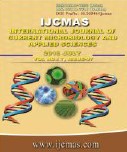


 National Academy of Agricultural Sciences (NAAS)
National Academy of Agricultural Sciences (NAAS)

|
PRINT ISSN : 2319-7692
Online ISSN : 2319-7706 Issues : 12 per year Publisher : Excellent Publishers Email : editorijcmas@gmail.com / submit@ijcmas.com Editor-in-chief: Dr.M.Prakash Index Copernicus ICV 2018: 95.39 NAAS RATING 2020: 5.38 |
Twenty four female KF calves were selected and distributed randomly into 4 groups of 6 animals each based on their body weight and age in a randomised block design (RBD). In group T1, the concentrate mixture consisted of mineral mixture without iodine. The animals in group T2 and T3 were supplemented with iodine at 0.25 and 0.5 ppm of dietary DM while in group T4, 4 micronutrients i.e. chromium, niacin, vitamin E and Zn were supplemented @ 1.5, 600 40 and 40 ppm, respectively for 150 days. Results showed that there were no significant differences among the treatments in both the season in morning rectal temperature. However in afternoon rectal temperature significant (<0.01) difference was observed in treatment groups. The rectal temperature was significantly (P<0.05) higher in summer as compared to winter. Pulse rate was significantly (P<0.05) differ among the overall treatment groups. The mean morning pulse rate was significantly (P<0.01) higher in winter as compare to summer. Interestingly in afternoon pulse rate is significantly (P<0.05) higher in summer as compare to winter. In morning respiration rate there is no significant difference observed due to treatment groups In winter season and summer season .however in afternoon respiration rate was significantly lower in treatment group (T4) as compare to other .In season wise respiration rate was significantly (P<0.01) higher in summer as compare to winter. Cortisol (ng/ ml) was significantly (P<0.05) lower in T4 (1.55a±0.13) groups than T1 (2.19b±0.21) group. However in season wise mean plasma cortisol (ng/ ml) levels was significantly (P<0.01) higher in summer as compared to winter. This study concludes that the micronutrients are beneficial for comforts of animals and it should be altered according to season i.e. to decrease the stress levels of animal and increase efficiency
 |
 |
 |
 |
 |